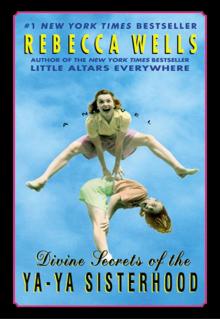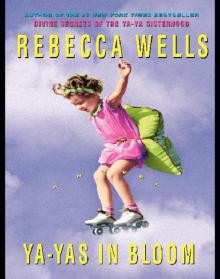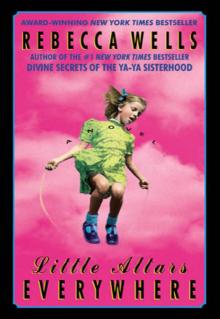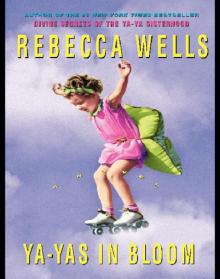- Home
- Rebecca Wells
Ya-Yas in Bloom: A Novel Page 5
Ya-Yas in Bloom: A Novel Read online
Page 5
Caro and Vivi tried to match their stride as they walked over to Teensy and Necie. Genevieve stepped up to the concession stand. She already knew what the girls wanted, so she made the requests herself. After chatting with Gerald, she called the girls over to the counter and handed them each their favorite candy. Teensy got her Milk Duds, Vivi received her Milky Way bar, Necie got her colorful jelly Chuckles, and Caro, her Bit-O-Honey. When Genevieve handed them each a small Coca-Cola, she also included gobs of napkins. “Just do your best,” she said to the red-velvet-clad girls, “not to spoil your outfits.” Genevieve held a great box of popcorn for herself and to share with her troops.
“Oh, thank you, Mrs. Whitman,” Necie said, upon receiving her Chuckles.
“Necie, ma petite choux,” Genevieve said, “please call me Genevieve, not Mrs. Whitman. Especially here in my palace of escape.”
“I’m sorry. But Mama told me to always—”
“I know your Mama means well, cher, and you may call me Mrs. Whitman whenever we are in her presence. But the rest of the time, please remember that I am Genevieve. That is my name. I am a free woman.”
“Yes ma’am,” Necie said, her head hanging down, embarrassed.
Genevieve hugged the girl to her and, as if by magic, produced a Mounds bar from the pocket of her red wool dress lined in fur at the hem.
Necie raised her head and whispered, “Merci, Genevieve.”
“Caro,” Genevieve said, “would you care to join our entourage as we prepare to witness zee Galaxy of Mystery?”
Caro looked at the other three girls, rolled her eyes, then said, “Indeedy-do, free lady!”
“Très bien!” Genevieve said, and handed Caro a box of Jujubes. “Now, we have quatre elfes d’ Noël!”
The four little girls followed Genevieve past the heavy maroon curtain that was held back by a thick gold rope and were led by a uniformed usher to the tenth row, center section—the best seats in the house. Inside the theater, the walls were painted as dark as berry juice. There were bronze wall sconces that cast a soft light up the deep-hued walls. Each sconce had a large red glass jewel in it that glowed like a dragon’s eye! The girls’ favorite part, though, was the glistening little stars set into the ceiling above.
The presentation was beyond anything they’d seen before! Master Giovanni and his unbelievable magic, how he sawed that lady into not two but three pieces, was beyond them. He made soup flow out of a hat, and then doves fly out of a handkerchief. It was sheer heaven. They passed the popcorn box among them and ooohed and aaahed the whole time. It was the first of countless adventures for Genevieve and the four girls together at the glorious exotic Bob—right in their own hometown.
After the magic show, Genevieve and the girls helped the Bobs close up the theater for the night.
“This is fun!” Necie said, thrilled to see behind the scenes.
Then Genevieve invited not only the Bobs, but also Giovanni and his assistants, to join them for ice cream at Labadeaux’s Ice Cream Parlor. The sound of bells on the wreath announced their arrival at the ice cream parlor. Not that they needed much announcing. What a sight they were as they opened the glass door with the Christmas wreath! Master Giovanni, still in his tuxedo. His female assistant, clad in a scanty red print dress with a slit on one side. His burly male assistant, who wore his cigarettes rolled up in the sleeves of his T-shirt. And an aged woman who seemed to be Master Giovanni’s mother. She spoke halting English, and they could not make out what country she came from or if she just had bad false teeth. The other citizens of Thornton sat sipping their milkshakes and malteds and tried not to stare. But this became impossible. After Genevieve had made sure her entourage had all the ice cream, banana splits, and cherry Cokes they wanted, Master Giovanni produced four different brightly colored scarves. He made the napkin dispenser disappear, and in its place appeared a vase of flowers.
“Yay! Do it again!” Vivi, Caro, Teensy, and Necie squealed.
“But no,” Master Giovanni said. “Now it is your turn to perform, my lovely ladies!”
With that, he handed each girl a scarf. The four girls jumped up, each of them with a scarf in her hands. Without speaking, they began to swirl the scarves around, and began to turn their little bodies in circles, swirling the scarves high and then low, wrapping the scarves around their faces like One Thousand and One Nights. At first Necie hung back, but soon she gave over to the fever and joined the dancing quartet. The Bobs, Genevieve, and Master Giovanni and his entourage began to applaud, laughing, and calling out suggestions.
“Roll your hips!” called out the female assistant.
“They are magnifico bambinas,” said Master Giovanni. “They should consider going on the stage.”
“La danse divine!” shouted Genevieve.
A local townswoman, who Genevieve recognized from her charity work, approached their table. Genevieve said, “Oh, do sit down with us and enjoy the show!”
“I most certainly will not,” the woman said. “I came over to say that you should make those girls behave. How will they ever grow up to be young ladies if you let them behave like this in public?”
Genevieve stared hard at the woman, and for a moment she did not speak. Then she said, “What this town needs, cher, is beaucoup filles dancing around with scarves in their teeth! This place needs more joie de vivre! We need gaieté! Rejouissance! Laissez les bon temps rouler!” Let the good times roll!
She gave a wink to Master Giovanni. She smiled at the lady and at the Bobs. The Bobs did not totally agree with her, or even understand everything she’d said, but they thought she was glorious. So long as they did not have to dance with scarves in their mouths.
The girls spun round and round and round the ice cream parlor, scarves in their hands, between their teeth, wrapped around their fingers like scarf rings. They did not dance madly like maenads from some Greek tragedy, but like muses, graceful and ready to inspire. The spark that lived in all of them rejoiced when they turned in circles, little whirling wild spirits. Like junior priestesses of some undomesticated tribe, they went somewhere else as they spun into a trance of dizziness as if they were praying. It looked as if they were bad little girls acting like wild sprites, and some of the folks in the ice cream parlor thought them rude and uncouth. But that is only because these townspeople did not know about whirling dervishes and what happens when they dance and pray, pray and dance. They did not know that dance can become prayer and prayer can become dance. The quartet of little girls knew it, and they were so happy in their bodies on that cold December night that they did indeed seem to glow.
Tending Young Buds
SCENES FROM MY EARLY CAREER
Sidda, February 1994
Most of all, I remember the Ya-Yas singing. I remember it from the time I was very young. They sang to us when we were toddlers. They did not sing traditional lullabies. They preferred adapting their favorite songs and singing them in a combination between torch and choir. I’m sure that the rest of the Petites Ya-Ya, like me, thought that “Smoke Gets in Your Eyes” was a nursery song. And when Mama sang to us about buttoning up our overcoats when the wind blew free, and to take good care of ourselves because “you belong to me,” we thought it was our own special going-outside song, composed by our mother for the special occasion of our leaving the house.
Teensy sang in her spicy Cajun soprano, Caro sang a strong alto, and Mama sang what she called “sopralto,” which meant she moved anything to fit into her range. Necie always played the piano. She came to our house and sat down at the baby grand in the living room, and within minutes she’d pick out an accompaniment to whatever they wanted to sing. This well-worn Steinway had been in the family for years; it had been bought by my great-grandmother Delia for my Mama when she was a little girl. Delia gave her that piano over the objections of my grandmother Buggy, who said that no child should have something so extravagant. According to Mama, Buggy’s protests were not the polite demurring of someone receiving a too-elegant gift—t
hey were the jealous raging of a daughter who resented that her own mother, who had refused to get so much as a workmanlike spinet for Buggy, should show such generosity to her granddaughter.
The Ya-Yas had spent many an afternoon when they were girls banging out tunes on this piano. And later we did, too. After so much pounding, the baby grand showed the strain. If you examined closely, the gouges in the wood above the keyboard looked suspiciously like teeth marks. Sometimes frustration would get the better of us when we were practicing. When I was small, I would sink my teeth down into that wooden ledge and grind out the pain of perfectionism. My brother Shep favored sharp blows with whatever object was handy, making dents in the piano that theater prop masters now call “distressed.” It is telling that while Mama might go berserk over a broken favorite crystal ashtray, she thought the marks on the piano were hysterical. While she did not encourage beaverlike expressions of angst, she did not punish us either.
When it came to singing, Mama could and would do anything she wanted. What she lacked in pitch, she made up in sheer force of personality. She was the one who did the funny bits—she would work with a cane and top hat, rolling her eyes and making suggestive jokes in between numbers. She didn’t have much of a voice, but God, she had stage presence! She played with whatever audience was in front of her, like they were her lovers and she couldn’t get enough of them. And like she knew they couldn’t get enough of her.
When the Ya-Yas sang harmony, they sounded sort of like the Boswell Sisters—if two of the sisters had colds and Connie Boswell was a little tipsy. I imagine that kids who grew up around trained singers might have found the Ya-Yas lacking in talent, or maybe downright scary. But to me they were stars. They were my first inspiration as a theatrical director. I will never, ever forget my first directing experience.
It was at a dressy Ya-Ya Valentine’s Day cocktail party in the early 1960s when I was eight. The Ya-Yas could never make it all the way from Ash Wednesday to Easter without a celebration, so they always had a big Valentine’s Day party. It punctuated the Lenten season with sweet abandon. It was a big event—almost everybody in town was there, all decked out in their most glamorous party clothes. Mama had it catered, and there were all the fanciest hors d’oeuvres, the names of which I still remember like they were part of a chant: Spiced Crab Canapé, Sherried Shrimp à la Ya-Ya, Mrs. Daniel Doiron’s Duck Paté, and Patsy Stafford’s Pecan Balls. The dessert table was filled with all kinds of chocolate goodies, along with Brandy Brioche, and my personal favorite, Queen’s Tart. Those pastry shells filled with that custard of pecans and Louisiana oranges and butter and cream and—oh, it was just taste heaven!
For the Valentine’s Day parties, the Ya-Yas made special place cards quoting lines from musicals, and each person was supposed to guess where to sit according to the quote. The four of them were as delighted when guests found the wrong place as when they got the right one. Caro whispered to the others, “You learn so much about a person when they get things wrong!”
For this particular party, Mama hired Willetta’s young nephews to park cars, and they showed up wearing their Sunday clothes. Willetta must have planned the outfits, because it was not the kind of thing Mama would have ever asked them to do. The nephews—Carver and Jefferson—took their job seriously. They stood at the edge of the driveway and opened the doors for Mama and Daddy’s friends in their Lincolns and Cadillacs. Since the nephews also did yard work for most of the guests, you could hear the ooohs and aaahhs that came from the white people when they saw their Negro yard boys all dressed up in a shirt and tie. At the beginning of the party, my brother Little Shep tried to beat Carver and Jefferson at opening the car doors, and sometimes they got into a little scuffle.
Daddy finally came out and said, “Son, let these boys do their jobs.”
Little Shep begged, “But Daddy, why can’t I park the cars? They get to do everything around here.”
“Son, you’re not old enough. When people drive up, you can open car doors and greet them, but that’s it.”
Jeff and Carver hung their heads. You could tell that they were angry. This was part of their job. They didn’t like Little Shep stepping in on their territory.
Little Shep was all excited, until Daddy turned and said: “Now, Shep, don’t you be taking any tips from my padnahs here. Jeff and Carver get all the money, you hear me, buddy?”
This wasn’t what Little Shep had in mind at all, but Daddy said, “Don’t give me any lip. Just let me hear you say ‘Yessir.’”
“Yessir,” my brother said. But I know that he kept some of those tips. After all the guests had arrived, he came in and emptied his pockets, bragging about how rich he was.
That evening the house was jumping. Moreau, my Daddy’s Cajun buddy, came in with big pans of food—duck gumbo, dirty rice, homemade garlic French bread. Daddy always said that Moreau was the best damn cook in the world, and that included anybody at Gallatoire’s, Antoine’s, and places in Europe, too. Even though it was just a cocktail party, he refused to let Mama serve only finger food. “You got to feed people when they come to your house,” he said.
Caro, Teensy, and Necie had arrived early with their outfits in blue plastic bags from the cleaners, carrying their train cases filled with makeup. One of the things I loved most about the official Ya-Ya parties—as opposed to just an ordinary dinner party—was that all the women got dressed together. They took over the entire hall and bathroom and Mama’s dressing room. It was a glorious thing to watch them getting ready. Some of my friends talk about the romance of watching their mother and father get ready for a party, but I never actually saw much of Daddy before a party. In the long hallway, Mama had moved the coatrack to one side, and all the ladies’ outfits were hanging from the rack, like characters they were waiting to become. On that Valentine’s Day, it was actually cold outside, a rare occasion in the state of Louisiana. Just the thing to make the Ya-Yas get their furs out of storage and bring them to the party. Mama was the only one who did not own a fur. She said, “I eat enough dead animals. I don’t want to wear them.” Actually, Teensy wore her knee-length mink to parties often, anytime she felt like it. Daddy always said it was because she never knew when she’d end up buck-naked and needing something to keep her warm. Stripping was something Teensy had done since she was a little girl. We had seen her do it since we were born and never thought twice about it.
Back in Mama’s dressing room, the small square 45 rpm record player was turned up loud. The Ya-Yas were listening to their “getting-dressed music.” Depending on their mood, this was Judy Garland, Sarah Vaughan, Ella Fitzgerald, and later, Dinah Washington. Every once in a while, they would get hooked on a particular song that wasn’t by any of their “Tune Ladies.” One year they flipped over “The Girl from Ipanema.” They played that song so much, it about drove my father batty, but they could not get enough of it.
We kids were supposed to stay back in the indoor playroom with Ruby. She was babysitting us so we wouldn’t try and take over the party, like we had been accused of in the past. We had the TV on in there, a bunch of games spread across the floor, and Baylor was playing with his paint set. Only the four of us were in there, since the other Ya-Yas had left their kids at home with their own sitters. Usually they liked to hire one sitter to take care of all of us. But Mama told me that Willetta had refused to let Ruby come back if they dumped all of the Ya-Ya kids on her again. The playroom was a nice enough place. Lord knows, we had just about everything we could have wanted back there, plus an ice chest full of Cokes and a box of petits fours Mama ordered specially for us.
But we knew the real action was happening in the front of the house.
As I sat on the couch with the rest of the kids, watching TV, I heard something that I thought I’d better check out. I was deep into a Nancy Drew phase. Every single thing that occurred—a car on the gravel road, Willetta claiming someone stole her favorite pot for cooking starch, a creak in the floorboards—presented itself as a mystery begging f
or me, only me, to solve. I tiptoed backward out of the den—girl detective, hoping no one would follow.
I crept toward my bedroom door, and I found them: all four Ya-Yas, spilling out of the dressing room, touching up their makeup. Mama, in her slinky black cocktail dress, was applying bright red lipstick to her lips. Necie wore a very romantic-looking pink chiffon number that I just loved. She was piling her luxurious long brown hair up on her head and spraying it into place. Caro had on black, too, a longer dress with an uneven hemline that looked vaguely 1920s. She had finished primping and leaned against the wall, smoking. Teensy was wearing a flaming red low-cut dress that was by far the shortest dress in Garnet Parish that year. When Mama finished putting on her lipstick, Teensy took that flame-red color from her and put some right on her own lips.

 Divine Secrets of the Ya-Ya Sisterhood
Divine Secrets of the Ya-Ya Sisterhood Ya-Yas in Bloom: A Novel
Ya-Yas in Bloom: A Novel Little Altars Everywhere
Little Altars Everywhere The Crowning Glory of Calla Lily Ponder
The Crowning Glory of Calla Lily Ponder The Crowning Glory of Calla Lily Ponder: A Novel
The Crowning Glory of Calla Lily Ponder: A Novel Ya-Yas in Bloom
Ya-Yas in Bloom